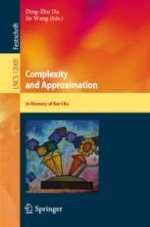2020 | OriginalPaper | Chapter
Ker-I Ko and the Study of Resource-Bounded Kolmogorov Complexity
Author : Eric Allender
Published in: Complexity and Approximation
Publisher: Springer International Publishing
Activate our intelligent search to find suitable subject content or patents.
Select sections of text to find matching patents with Artificial Intelligence. powered by
Select sections of text to find additional relevant content using AI-assisted search. powered by
